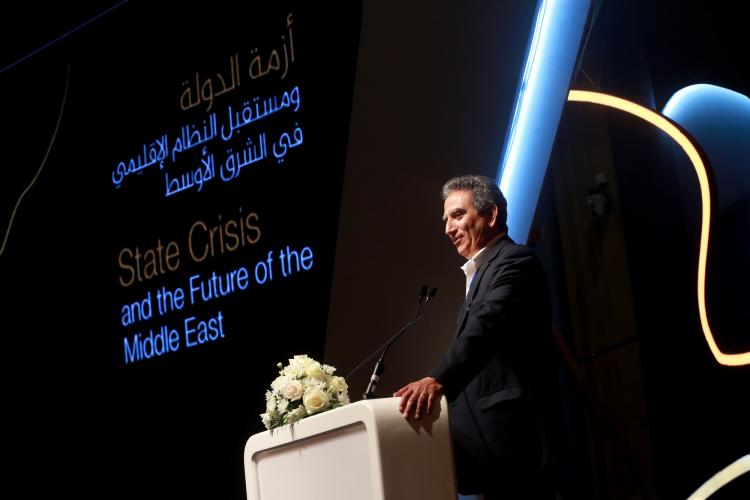
At the end of the first day of the 11th Al Jazeera Forum, held in Doha on the 15th and 16th of April 2017, Dr. Mostefa Souag, Acting Director General of Al Jazeera Media Network, delivered a speech at the forum’s gala dinner in which he spoke about some aspects of his own life that are closely related to the forum’s theme, and highlighted the manifestations of the modern state crisis in post-colonial Algeria.
During his speech, Dr. Souag referred to the "notorious crime" committed by French colonialism on 8 May 1945 in which 45000 people were killed in response to mass demonstrations staged by the Algerians as the Europeans celebrated the end of World War II. The demonstrators took to the streets in demand of independence, as promised by France, but the French colonialists “met the Algerian demonstrators with abuse and murder”.
Dr. Souag expressed surprise at some people who feel nostalgia for the era of colonisation under the pretext that they suffered more under the modern national state than they did under colonial France. He added that those who do not know colonisation think that it is better than the modern state; however, “if one truly knew colonisation, [he or she] would hope never to see it again”, he said.
Dr. Souag also pointed out that, near the end of the Algerian revolution, he, like all Algerians and Arabs, had dreamed of an independent national state that does not deprive people of liberty, dignity or justice. After the revolution, everyone celebrated independence and rejoiced in the establishment of the modern Algerian state that some criticise today. He explained that many achievements have been made under the modern Algerian state despite its drawbacks.
In addition, he noted that one of the achievements of the independent Algerian state is education. France, he said, left Algeria with only 5% literacy, and the number of Algerian students at the time did not exceed 500. However, schooling in the modern state has reached almost 100%. Moreover, the independent state has had a distinct health policy and has made efforts to “upraise the country on the basis of improved development policies”. For Dr. Souag and his generation, the dream “of a country that guarantees justice and preserves everyone’s dignity alongside all other values mentioned in this forum’s discussion sessions” remains.
The Acting Director General of Al Jazeera Media Network reiterated what the forum’s participants said about authoritarian states that “enslave, rather than serve, the people”. In the early 1970s, seven years after the French had evacuated, hundreds of Algerian students organised peaceful demonstrations in demand of Arabisation, as French was still the official language used in the state’s administration and education. The state reacted by exercising repression against demonstrators.
This coincided with the Arab “day of the setback” in June 1967, before which unity between Egypt and Syria had shattered and the Arabs had seen the failure of their dreams and aspirations. “Since then,” he said, “Arab patriotism has begun to decline in several Arab countries, including Algeria”. Dr. Souag added, “This leaves us with the question: Has the state betrayed the citizen? That may be true; however, the achievements of the modern independent states should not be forgotten”.
Dr. Souag recalled the period of President Boumediene's rule, “in which everyone remained tolerant and patient, hoping that the state would continue its development plans and that people should sacrifice part of their freedom for the sake of uplifting the homeland”. After Boumediene's death, a new president was elected, but in a closed room controlled by senior military officers. He added that “everyone dreamed of freedom and hoped that the political practice would preserve the independence of the parliament and the executive and judiciary authorities”. However, it turned out that all these authorities were confined to only one, and this became obvious to everyone after the coup against the elections in 1990s.
He stressed that governance in Algeria and other Arab states was based on the idea of the “leader” regime: that is, the belief that only the leader is able to run the country, thus dissolving the idea of freedom and the citizens’ right to choose their representatives. He added, "The opinions shared by the forum’s participants about the national state crisis is a reality that we all live. However, although the dreams of our generations were shattered, we should not give up hope.”
Concerning the relation between the media and the establishment of democratic governance, Dr. Souag explained that freedom of thought and media is the mother of all freedoms, adding that this only applies to free and professional media that consider truth to be the ultimate goal. Measuring the state’s power indicators depends on the extent to which it respects freedoms of opinion, thought, expression, and information, he said.
He concluded by saying that corruption, which afflicts most, if not all, Arab regimes, can be resisted only by means of free media that are capable of exposing corruption, “which is corrupt governments remain inimical to these freedoms”.

